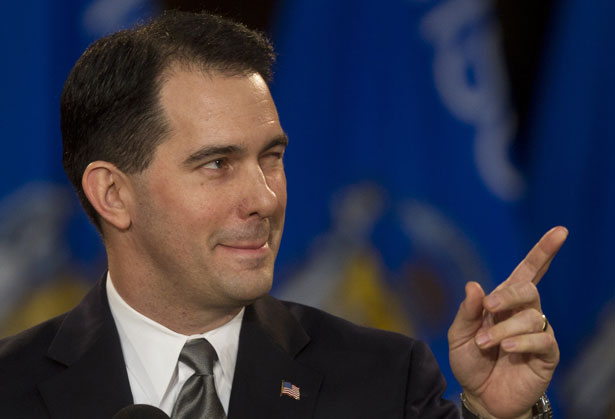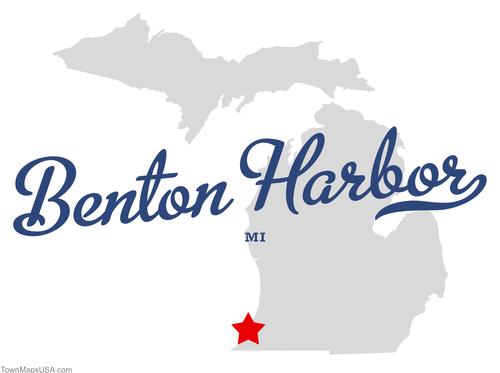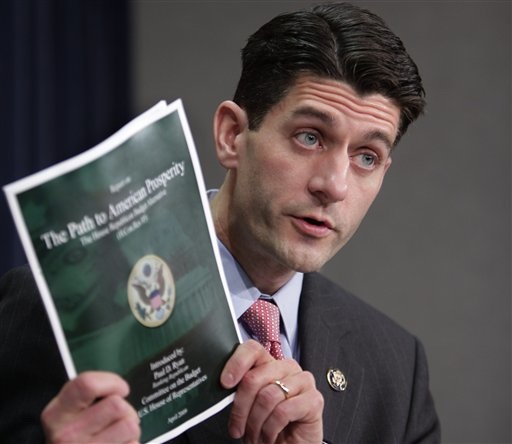Wisconsin Supreme Court Recount Begins
The recount in Wisconsin's Supreme Court race begins on Wednesday, April 27. Why was the recount called, how will it be carried out, and how can individuals get involved?

The recount in Wisconsin's Supreme Court race begins on Wednesday, April 27. Why was the recount called, how will it be carried out, and how can individuals get involved?
Submitted by Jennifer Page on
 Wisconsin Governor Scott Walker has pledged to create 250,000 new jobs in Wisconsin. He has an interesting way of going about it. Dan Bice of the Milwaukee Journal Sentinel reported that Walker visited Curt Manufacturing near Eau Claire, Wisconsin last week to award the state manufacturing plant a $625,000 transportation grant and congratulate himself for creating 125 extra jobs as a result. "This project directly creates 125 new jobs and indirectly creates 129 jobs, resulting in $12.6 million in annual wages right here in Wisconsin," Walker said in a news release. "By providing these funds, we are bringing quality jobs to Wisconsin while improving road access to Curt Manufacturing's expanded facility." But credit for the same 125 jobs was already claimed back in December by then-Governor Jim Doyle when the Department of Commerce announced the administration was giving the same company $400,000 in tax credits and $11 million in tax-free bonds under a 2009 stimulus program. Doyle said the extra money would "create 125 extra jobs and result in $12.8 million investment to the community." Could the firm be creating 250 new jobs? Er, no says a company spokesman. Curt has committed to adding 125 positions by 2014. So Walker simply ladled out an extra $625,000 for the same 125 jobs. That amounts to a whopping $96,000 in taxpayer support per job. Let's hope they pay more than minimum wage.
Wisconsin Governor Scott Walker has pledged to create 250,000 new jobs in Wisconsin. He has an interesting way of going about it. Dan Bice of the Milwaukee Journal Sentinel reported that Walker visited Curt Manufacturing near Eau Claire, Wisconsin last week to award the state manufacturing plant a $625,000 transportation grant and congratulate himself for creating 125 extra jobs as a result. "This project directly creates 125 new jobs and indirectly creates 129 jobs, resulting in $12.6 million in annual wages right here in Wisconsin," Walker said in a news release. "By providing these funds, we are bringing quality jobs to Wisconsin while improving road access to Curt Manufacturing's expanded facility." But credit for the same 125 jobs was already claimed back in December by then-Governor Jim Doyle when the Department of Commerce announced the administration was giving the same company $400,000 in tax credits and $11 million in tax-free bonds under a 2009 stimulus program. Doyle said the extra money would "create 125 extra jobs and result in $12.8 million investment to the community." Could the firm be creating 250 new jobs? Er, no says a company spokesman. Curt has committed to adding 125 positions by 2014. So Walker simply ladled out an extra $625,000 for the same 125 jobs. That amounts to a whopping $96,000 in taxpayer support per job. Let's hope they pay more than minimum wage.
The White House is circulating a draft Executive Order requiring disclosure of contributions to "third party" or "independent" expenditure groups by corporations receiving government contracts. During the 2010 elections, much of the unlimited election spending made possible by the U.S. Supreme Court's Citizens United decision was kept secret by groups taking advantage of the 501(c) section of the tax code. The President's proposed order would lift the veil on secret spending in time for the 2012 elections.
 The almost $200 million in tax cuts that Wisconsin Governor Scott Walker has given to corporations have been both lauded and hated by the public and media.
The almost $200 million in tax cuts that Wisconsin Governor Scott Walker has given to corporations have been both lauded and hated by the public and media.
 Tea Party members who railed against health care reform because of the spin they were sold about how "Obamacare" would affect Medicare played a big role in returning the House of Representatives to Republican control.
Tea Party members who railed against health care reform because of the spin they were sold about how "Obamacare" would affect Medicare played a big role in returning the House of Representatives to Republican control.
I'm betting that many of them, if they're paying attention to what Rep. Paul Ryan (R-Wisconsin) wants to do to the Medicare program, are having some serious buyer's remorse. If Democrats are wise, they're already drafting a strategy to remind Medicare beneficiaries, including card-carrying Tea Party members, just how fooled they were into thinking that Republicans were the protectors of the government-run program they hold so dear.
The week of April 10-16 saw the layoff of every public school teacher in Detroit, and the initial fruition of the highly-contested bill that allows emergency financial managers to have unconditional control over a city in a financial emergency. The city of Benton Harbor, Michigan, declared to be in a financial emergency by Governor Rick Snyder, now knows that, according the Snyder, the voter's voice doesn't really matter anymore.
 Joseph Harris, the city's new Emergency Financial Manager (EFM), dismantled the entire government, only allowing city boards and commissions to call a meeting to order, approve of meeting minutes and adjourn a meeting.
Joseph Harris, the city's new Emergency Financial Manager (EFM), dismantled the entire government, only allowing city boards and commissions to call a meeting to order, approve of meeting minutes and adjourn a meeting.
The law that allows Harris to "exercise any power or authority of any office, employee, department, board, commission, or similar entity of the City, whether elected or appointed," was passed in March after the urging of Governor Snyder, and despite thousands of protesters who came to the Lansing capitol throughout February and March.
Last week, Wisconsin Governor Scott Walker put a deceptively positive gloss on the legal battles surrounding his stalled union-busting bill in an interview with the right-wing Newsmax website.
Ohio Democrats this week introduced into a divided state legislature a new bill that would allow Ohio citizens to recall Governor John Kasich and other legislatures. The state has been in an ideological upheaval for months after Kasich's budget bill was introduced, similar to the Wisconsin bill that has received incredible national attention for stripping unions of their collective bargaining rights, and eventually signed April 2nd after some concessions were made by the Republican-held Assembly and Senate.
 On March 23, 2011 a group called Revere America issued a dire-sounding PRNewswire press release titled, "Americans Fear Loss of Freedom on Anniversary of Health Care Reform Law." It warned that "a majority" of Americans view health care reform as "a threat to their freedom" and cited a poll by Bill McInturff of Public Opinion Strategies to prove it. The release came well after Revere America had spent $2.5 million on attack ads in the 2010 mid-term elections to defeat Democratic candidates in two states -- New York and New Hampshire -- who had voted in favor of health care reform. Just prior to the mid-term elections, in the autumn of 2010, Revere America ran a a slew of false and misleading attack ads against the health care reform bill that erroneously called health reform "government-run healthcare" (a Republican and insurance industry buzz-phrase). The ads said that the new law will result in higher costs and longer waits in doctors' offices. In another false claim aimed at inducing fear, the ads told viewers that "your right to keep your own doctor may be taken away."
On March 23, 2011 a group called Revere America issued a dire-sounding PRNewswire press release titled, "Americans Fear Loss of Freedom on Anniversary of Health Care Reform Law." It warned that "a majority" of Americans view health care reform as "a threat to their freedom" and cited a poll by Bill McInturff of Public Opinion Strategies to prove it. The release came well after Revere America had spent $2.5 million on attack ads in the 2010 mid-term elections to defeat Democratic candidates in two states -- New York and New Hampshire -- who had voted in favor of health care reform. Just prior to the mid-term elections, in the autumn of 2010, Revere America ran a a slew of false and misleading attack ads against the health care reform bill that erroneously called health reform "government-run healthcare" (a Republican and insurance industry buzz-phrase). The ads said that the new law will result in higher costs and longer waits in doctors' offices. In another false claim aimed at inducing fear, the ads told viewers that "your right to keep your own doctor may be taken away."
 Democrats who think Paul Ryan and his Republican colleagues have foolishly wrapped their arms around the third rail of American politics by proposing to hand the Medicare program to private insurers will themselves look foolish if they take for granted that the public will always be on their side.
Democrats who think Paul Ryan and his Republican colleagues have foolishly wrapped their arms around the third rail of American politics by proposing to hand the Medicare program to private insurers will themselves look foolish if they take for granted that the public will always be on their side.
Rep. Ryan's budget proposal would radically reshape both the Medicare and Medicaid programs. It would turn Medicaid into a block grant, which would give states more discretion over benefits and eligibility. And it would radically redesign Medicare, changing it from what is essentially a government-run, single-payer health plan to one in which people would choose coverage from competing private insurance firms, many of them for-profit.
Center for Media and Democracy (CMD)
520 University Ave, Ste 305 • Madison, WI 53703 • (608) 260-9713
CMD is a 501(c)(3) tax-exempt non-profit.
© 1993-2025